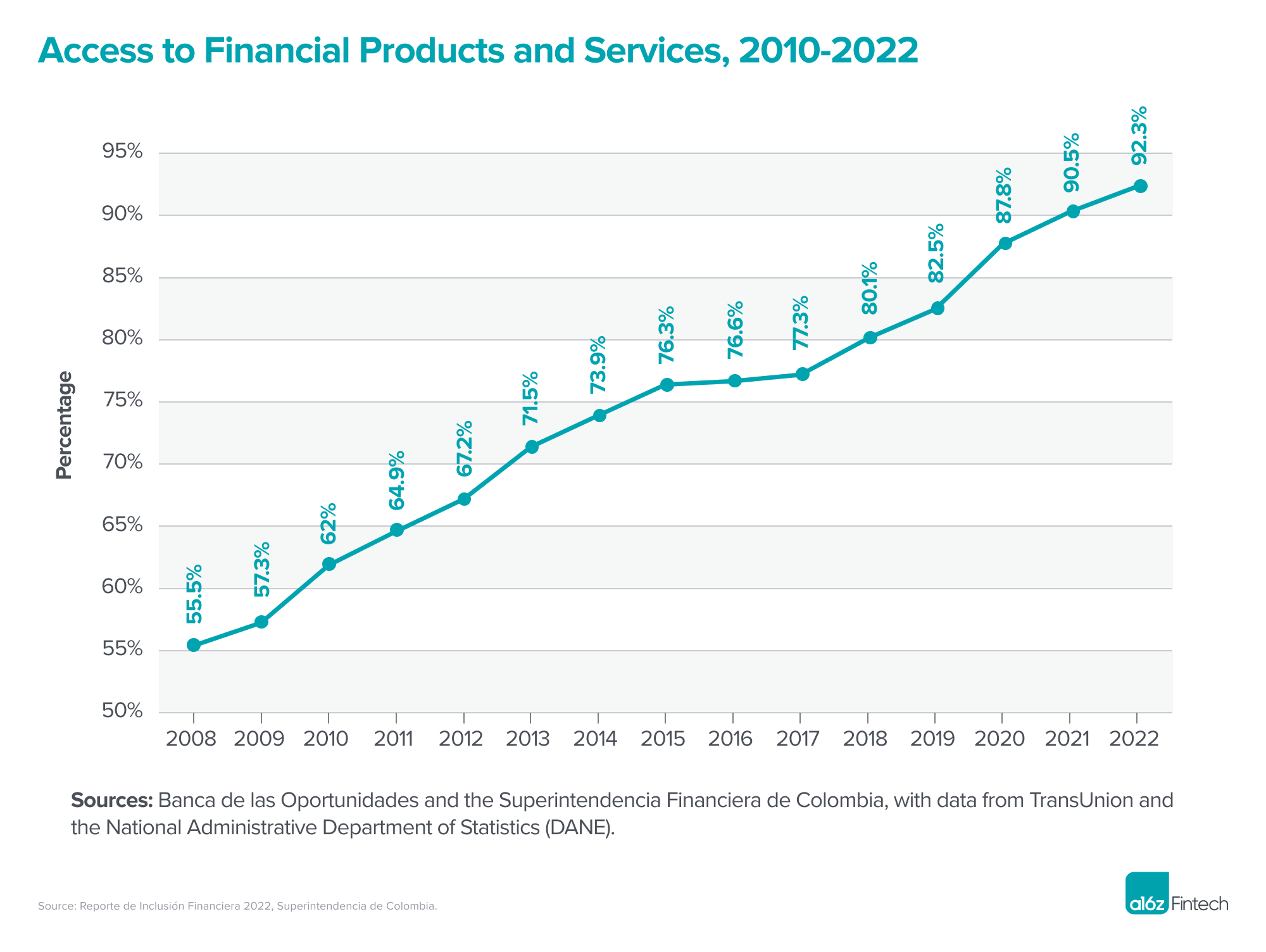Colombia’s finance sector has historically been one of the most regulated in the world. Over the past decade, however, the country has quietly become the third-largest fintech hub in Latin America (trailing only Brazil and Mexico), home to nearly 300 fintech companies. Seventy-six percent of Colombians use fintech services, according to an Ernst & Young report, the highest fintech adoption rate in Latin America, and from 2008 to 2022, the percentage of Colombian adults who hold a banking product rose from 55% to over 90%.
Given that the majority of Colombians now have access to a smartphone, the internet, and a basic bank account, the conditions are set for an acceleration of financial innovation and inclusion. That trend is being reinforced by advances in licensing and Open Finance, the promise of ubiquitous instant payments, and regulatory support for innovative fintech solutions.
In particular, several government actions have expanded fintech’s capabilities in Colombia in recent years.
De novo licenses spur market competition
For years, it was difficult and expensive to obtain a de novo banking license in Colombia, a response to the government’s historic struggle to tamp down drug trafficking and money laundering. Today, the banking sector in Colombia remains highly concentrated: there are only 29 fully-licensed banks (establecimientos de credito), and the three largest banking conglomerates control over 60% of deposits, according to the International Monetary Fund.
However, a few years ago the Superintendencia Financiera de Colombia, the local regulator, opened up the market by introducing what’s known as a Compania de Financiamiento license. This license has lighter capital and regulatory requirements, while still allowing its holder to gather deposits via savings or electronic deposit accounts, offer loans backed by these deposits, and issue cards.
Since then, fintech companies including Rappi, Uala, Bold, Mercado Pago, and Nubank have received approval to offer deposit, transaction, and credit accounts. Not only does this allow new entrants to offer a comprehensive suite of financial products (and capture the full economics that lead to sustainable business models), it also gives Colombian consumers greater confidence that new entrants can be trusted with their money.
Open banking expands access and inclusion
Alongside opening the market to new entrants, the government has also committed to developing a robust Open Finance framework, following Brazil’s example. Last year, the government included Open Finance in its National Development Plan, a foundational law that sets the economic development program for the next four years. If fully implemented, this will allow Colombians to own and access their banking data regardless of which institution they bank with. In addition, the government has signaled an openness to the potential for full bank account portability, allowing people to migrate account information between banks, just like they do their cell phone numbers when they switch carriers.
Instant, interoperable payments will accelerate digitization
Following the success of Pix in Brazil, the Colombian government has committed to launching its own version of an instant, interoperable and free payment system in the next two years. Recently, the Central Bank governor (who regulates payments) indicated that they will announce the technology partner by October of this year, and that they expect the system to be live before the end of 2024. Considering that most interbank payments still carry meaningful costs (up to $2 per payment), this will be a boon for the further digitization of payments in the country.
The future of fintech in Colombia
In Colombia, fintech continues to expand its reach—the industry is estimated to be growing at around 120% a year, and the number of fintech companies in the country has more than doubled in the past five years.
Through recent government actions, Colombia is moving toward a more open and transparent financial system—one where a greater number of fintech companies compete to earn users’ trust, money, and business based on the quality of their products and services. The new superintendent has reaffirmed the government’s commitment to an inclusive agenda that fosters competition and innovation. Now it’s up to founders and entrepreneurs to seize the moment by continuing to build the products that will power the future of banking and finance in Colombia.
See a16z.com/global-payments for more.



